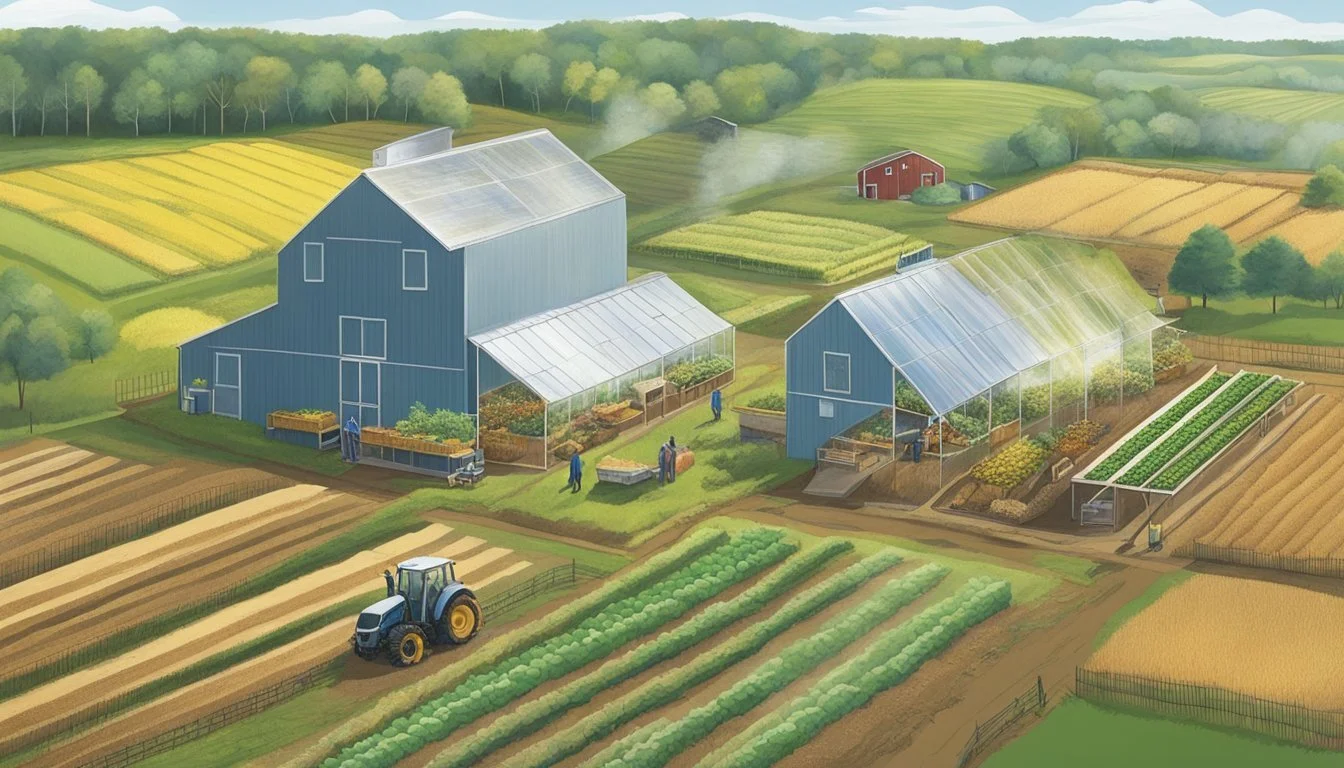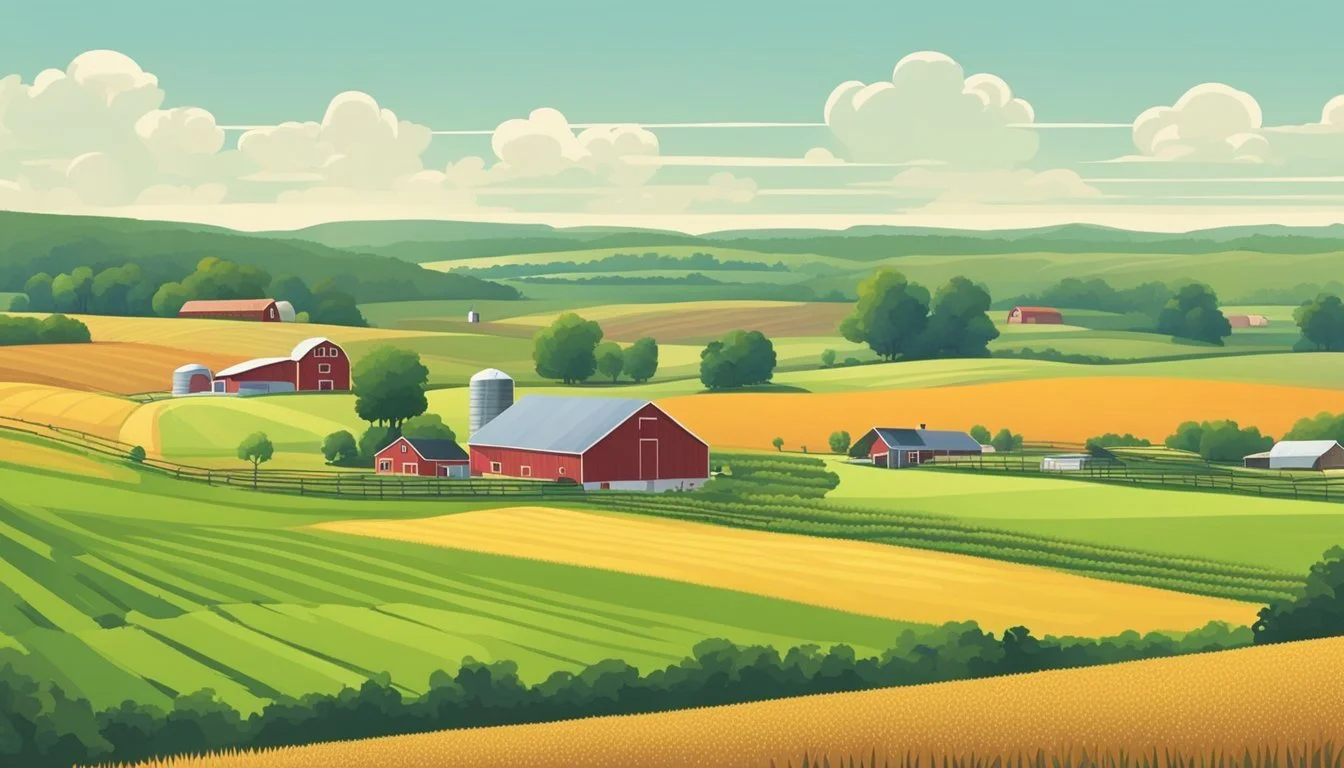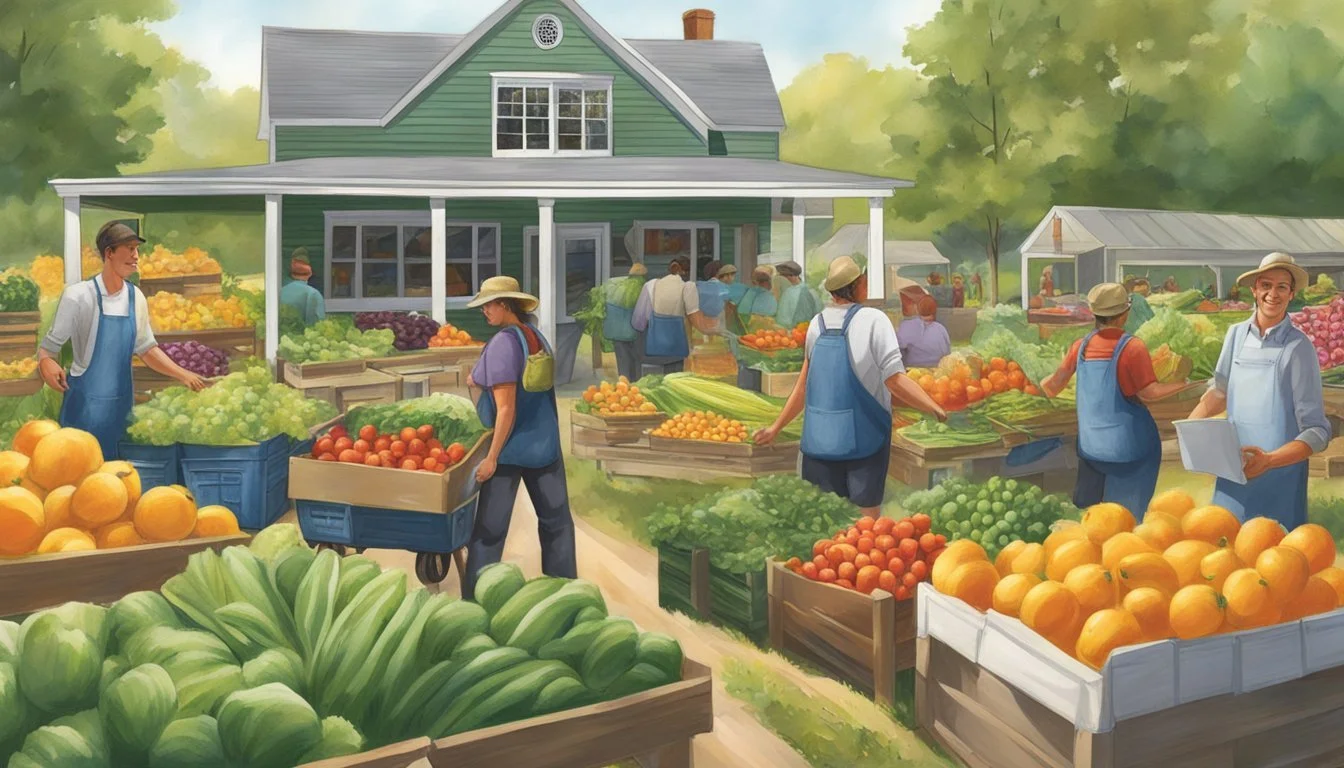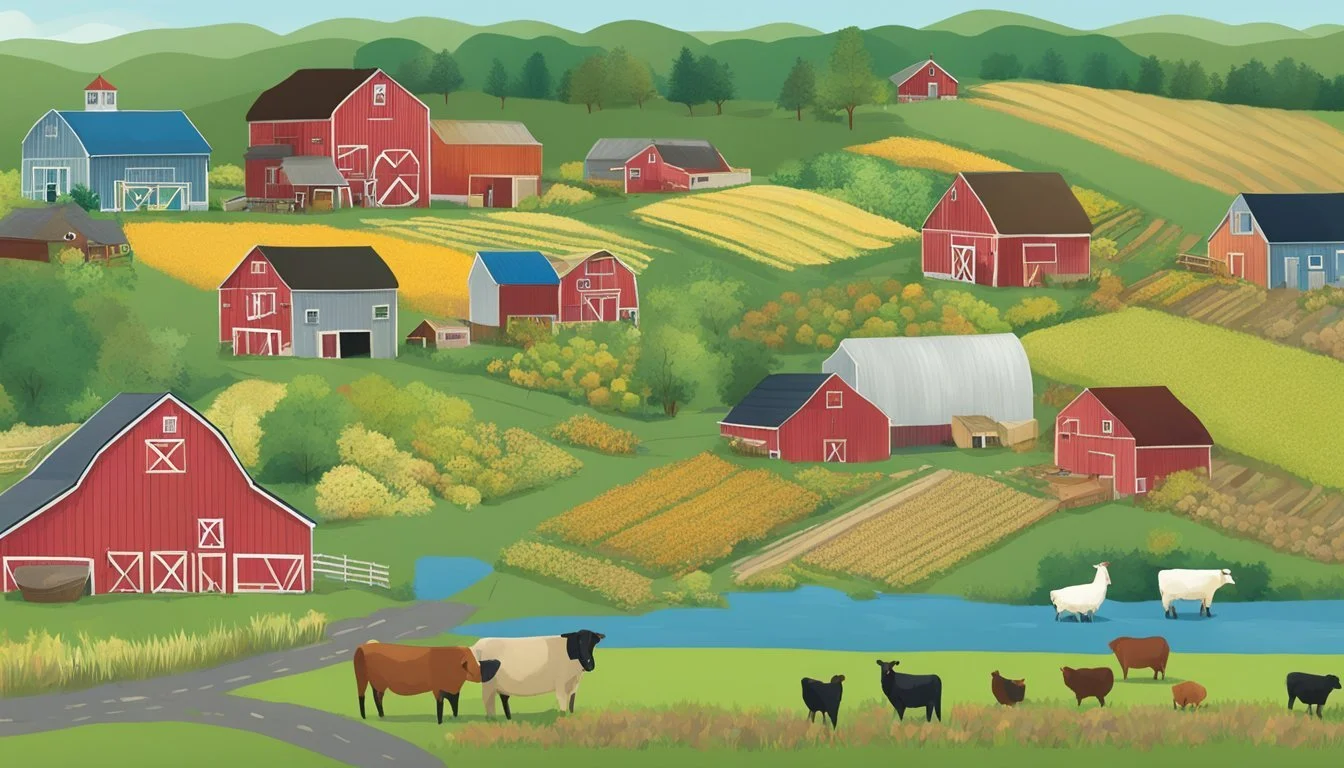Farming Communities in Massachusetts
Sustainable Practices and Growth
Farming communities in Massachusetts play a vital role in preserving the state's rural character while supporting economic opportunities through agriculture. These communities are represented by over 170 Agricultural Commissions, which help promote local farming practices and advocate for farmers' interests. With such robust support, Massachusetts has seen a consistent growth in its farm operations, even as the total farm acreage has decreased.
The Right-to-Farm law in Massachusetts, established in 1990, has significantly contributed to the protection and sustainability of farming activities within the state. Despite challenges like urban development, this legislation has helped prevent the loss of farmland by ensuring that farm operations can continue without interference. Notably, since the enactment of this law, farm operations have grown by 12 percent.
Massachusetts offers various types of farms, from organic farms to equine stables and maple sugar houses. Such diversity in agricultural pursuits not only meets the needs of residents but also attracts visitors, fostering a deeper appreciation for the farming heritage that is integral to the state's identity. This blending of tradition and modern agricultural practices showcases the resilience and innovation prevalent within Massachusetts's farming communities.
History of Farming in Massachusetts
Tracing the history of farming in Massachusetts reveals how early agricultural practices established the foundation of farming communities, shaping the state's agricultural landscape.
Early Agricultural Practices
In the early days, farming in Massachusetts relied heavily on subsistence agriculture. Native Americans, such as the Wampanoag, planted crops like corn, beans, and squash using techniques adapted to the local environment. They practiced crop rotation and land management to maintain soil fertility.
With the arrival of European settlers in the 17th century, farming methods evolved. English settlers introduced livestock such as cattle and sheep. They implemented mixed farming systems, combining crop cultivation with animal husbandry. By the 18th century, small, diversified farms dotted the region, supporting the local economy.
Advancements in the 19th century, such as the establishment of the Massachusetts Board of Agriculture in 1863, aimed to improve farming techniques. The board provided resources and knowledge to farmers, encouraging innovations that boosted productivity.
Development of Farming Communities
Farming communities in Massachusetts began to formalize in the 18th century. Villages and towns grew around these farms, creating close-knit agricultural hubs. These communities were characterized by shared resources and communal labor. Efforts to collectively manage common land for grazing livestock also strengthened these bonds.
During the early 19th century, improvements in transportation and market access enabled farmers to expand their reach. Railroads and canals facilitated the movement of goods, opening up new markets for Massachusetts' agricultural products. This period saw significant growth in dairy farming, with many farms focusing on milk production for urban centers.
Today, despite urbanization and industrial challenges, the spirit of these farming communities persists. Small family-owned farms and local farmers' markets continue to play a vital role in preserving Massachusetts' rich agricultural heritage.
Overview of Massachusetts Farming
Massachusetts boasts a diverse agricultural landscape with many types of farms, a variety of commonly grown produce, and a growing interest in organic farming.
Types of Farms
Massachusetts farms vary widely in type and scale. Dairy farms, though fewer in number, play a significant role in the state's agriculture. Cranberry bogs are particularly notable, contributing substantially to the local economy.
Vegetable and fruit farms are also prevalent. In Worcester County alone, over 21 percent of the farms are located. This widespread distribution highlights the state's commitment to maintaining open spaces for agricultural use.
Commonly Grown Produce
Massachusetts farms cultivate an array of produce, both fruits and vegetables, with cranberries and apples among the most prominent fruits.
Vegetables such as corn, tomatoes, and pumpkins are widely grown. Farmers markets across the state thrive on the fresh, locally grown produce. These markets not only support local economies but also foster community engagement.
Organic Farming Expansion
There is a notable shift towards organic farming. Massachusetts has seen substantial growth in the number of organic farms and acreage dedicated to organic practices.
This trend is driven by consumer demand for healthier, pesticide-free products. The state supports this movement through educational resources and financial incentives. As a result, organic farming is becoming an integral part of the Commonwealth's agricultural identity.
Farming Regulations and Resources
Massachusetts provides a robust framework for supporting its farming communities through regulations such as Right to Farm Bylaws and several resources ranging from state organizations to non-profits aimed at aiding farmers and preserving agricultural land.
Right to Farm Bylaws and Ordinances
Massachusetts's Right to Farm Bylaws protect farmers' rights to conduct accepted agricultural practices without facing nuisance complaints. These bylaws recognize the importance of farming activities like noise, odors, and dust as part of normal operations. Many towns have adopted these bylaws to encourage agricultural activities and safeguard farmers. It's essential for farming communities to understand these regulations to operate within the legal framework and protect their livelihoods.
Agricultural Resources and Support Organizations
Farmers in Massachusetts have access to a plethora of resources for supporting their agricultural activities. The Massachusetts Department of Agricultural Resources (MDAR) offers various programs and financial aid. ATTRA provides comprehensive resources on sustainable practices. The USDA supports farmers through grants, loans, and education. Non-profits like Land for Good assist in land access and farm succession planning. Engaging with these organizations can significantly aid in farm management and sustainability.
Land Preservation and Acquisition
Preserving agricultural land is a priority in Massachusetts. Chapter 61A allows land reduction in property taxes for those committed to farming. Programs like the Agricultural Preservation Restriction (APR) help prevent farmland from being developed, ensuring it remains available for agriculture. Organizations such as Land for Good work with farmers to acquire and preserve farmland through innovative approaches, securing the future of farming in the state. Proper utilization of these resources helps maintain the agricultural landscape.
Farmers and stakeholders must familiarize themselves with these regulations and resources to ensure the viability and prosperity of farming in Massachusetts.
Community and Economic Impact
The farming communities in Massachusetts play a vital role in both the local economy and community engagement. These impacts can be seen through the economic contributions of local agriculture and the involvement of community members in various agricultural committees and organizations.
Local Agriculture's Role in the Economy
Local agriculture serves as a foundational pillar of Massachusetts' economy. Farmers and agricultural businesses generate substantial revenue through the sale of locally grown produce, dairy, and meat products.
Numerous programs, such as the Urban Agriculture Program and the Massachusetts Food Ventures Program, provide financial support to enhance food access and promote sustainable farming practices. These initiatives help to ensure that local agriculture remains economically viable and competitive.
Economic contributions extend beyond direct farm revenue. Agritourism, farmers' markets, and farm-to-table restaurants attract tourists and locals alike, bringing additional income to communities. By preserving farmland and encouraging sound farming practices, agricultural commissions and organizations such as American Farmland Trust and Berkshire Grown play a significant role in sustaining the agricultural economy.
Community Involvement and Agriculture Committees
Community involvement is integral to the success of farming in Massachusetts. Agricultural commissions, or AgComs, represent the voice of the farming community, working to preserve and revitalize agricultural lands. These commissions support economic opportunities through initiatives that encourage community members to engage in and promote local agriculture.
Local food system organizations, such as the Massachusetts Food System Collaborative, work with community members, agencies, and institutions to foster a robust agricultural network. Educational outreach programs by entities like the Center for Agriculture, Food and the Environment further strengthen community ties, ensuring that the benefits of local agriculture are widely appreciated and supported.
Through these efforts, community members are not just consumers but active participants in sustaining and promoting their agricultural heritage. This collaboration enhances the social fabric and ensures the long-term vitality of local agriculture.
Farming Challenges and Adaptations
Farmers in Massachusetts face various challenges related to climate and other contemporary issues. They adapt by employing innovative strategies to ensure the sustainability and productivity of their farms.
Adapting to New England's Climate
The climate in New England poses several challenges for farmers. The region experiences unpredictable weather patterns, affecting the growing season.
Farmers have to deal with extreme weather conditions such as heavy rains, early frosts, and prolonged dry spells. These changes require increased resilience and preparedness.
To tackle these issues, farmers are using climate adaptation strategies. Crop diversification is one method to mitigate risk. Additionally, employing advanced technologies like weather forecasting tools and irrigation systems helps manage water usage efficiently.
Another adaptation involves adjusting planting schedules to better align with shifting seasons. Community programs and government initiatives also support farmers in sharing resources and knowledge.
Contemporary Challenges for Farmers
Besides climate, several other challenges affect farmers today. Land availability is a major concern. Protecting productive farmland from development pressures remains critical.
Economic pressures due to rising costs of inputs like seeds, fertilizers, and equipment impose financial burdens. Limited access to profitable markets is another difficulty.
Farmers also face labor shortages, impacting planting and harvesting operations. To address this, some farms invest in mechanization to reduce dependency on manual labor.
Moreover, there is a push towards sustainable farming practices. Adoption of organic farming methods, integrated pest management, and soil health improvement techniques is growing.
Government programs and local initiatives increasingly provide financial assistance and training to help farmers navigate these challenges.
In addressing both climate and contemporary issues, Massachusetts farmers continuously adapt and innovate.
Farm Ownership and Operations
Farm ownership and operations in Massachusetts encompass important aspects such as establishing farms and planning for their succession. These elements are critical for both new and established farmers to ensure sustainability and growth within the farming community.
Establishing and Operating a Farm
Establishing a farm involves multiple steps that include acquiring land, securing financing, and understanding local regulations. Community Involved in Sustainable Agriculture (CISA) and the Southeastern Massachusetts Agricultural Partnership (SEMAP) offer workshops that assist beginning farmers in these areas.
Farm operations require efficient management of resources. This includes coordinating a farm crew, navigating farm labor laws, and implementing sustainable practices. Massachusetts farms produce an average of $85,721 in agricultural products on 66 acres, indicating a focus on high-value crops and efficient use of limited land.
Established farmers often adapt operations to market changes and new technologies. The state’s Right-to-Farm laws provide protections that help farms operate without undue interference, contributing to a 12% growth in farm operations since 1990.
Succession Planning for Farmers
Succession planning ensures continuity of farm operations across generations. With the average Massachusetts farmer being 58.7 years old, planning for transition is critical. This involves legal and financial preparation to transfer ownership to family members or other successors.
Workshops and resources from organizations like CISA and SEMAP provide guidance on succession planning, addressing common issues such as estate taxes and farm valuation. Transparent communication among family members and stakeholders is essential to successful succession.
Proper succession planning helps sustain farms, preserving their economic value and community contributions. As older farmers retire, effective planning supports new farmers in taking over operations, thereby maintaining the agricultural landscape of Massachusetts.
Finding and Securing Farmland
Finding and securing farmland in Massachusetts involves using specialized tools and navigating the acquisition process to meet the needs of both beginning and established farmers. Key considerations include understanding the available land, zoning laws, and collaboration opportunities.
Farmland Finder Tools and Services
Several resources aid farmers in locating available land. New England Farmland Finder is a prominent platform that helps connect farmers with landowners. It lists various properties for sale or lease, providing detailed descriptions and contact information.
ATTRA and the Beginning Farmer and Rancher Development Program (BFRDP) offer comprehensive databases and guides. These resources assist farmers in identifying viable lands and assessing their potential based on soil quality, market access, and water availability.
Interactive tools like GIS mapping services allow users to pinpoint land that meets specific requirements. These tools can highlight topography, soil types, and existing agricultural operations nearby. By leveraging these technologies, farmers can make informed decisions about potential farmland.
Navigating Farmland Acquisition
Acquiring farmland in Massachusetts requires understanding various purchasing or leasing options. Common choices include fee title purchases, leases with an option to buy, and crop-sharing agreements. Each arrangement has benefits and challenges, depending on a farmer's long-term goals and financial position.
Zoning laws and land use regulations play a crucial role in the process. Farmers must ensure that the land is appropriately zoned for agricultural use. Navigating these regulations often requires collaboration with local governments and community organizations.
Beginning farmers can access support from programs like SARE (Sustainable Agriculture Research and Education), which provides education and funding. Established farmers may benefit from agricultural conservation easements that help preserve farmland while providing financial incentives.
Farm success often hinges on a thorough assessment of land fertility, community preferences, and market conditions. By understanding these factors, farmers can secure land that aligns with their business strategies.
Agricultural Education and Development Programs
Massachusetts offers a wide range of programs to support agricultural education and development. These initiatives aim to educate future farmers, provide resources to current farmers, and involve the community in sustainable agricultural practices.
Workshops and Training Opportunities
Massachusetts hosts numerous workshops and training opportunities for those interested in agriculture. Programs such as the ones provided by the Massachusetts Department of Agricultural Resources (MDAR) offer vital resources for start-up farmers, including business management, marketing, and sustainable farming practices.
Local institutions like Greenfield Community College and Mount Wachusett Community College provide specialized training in regenerative agriculture. These educational sessions are often listed on an ag-tivities calendar, ensuring participants are informed about upcoming events.
The Farm School and the New England Small Farm Institute also play a significant role by offering hands-on training and practical experience. These workshops equip farmers with the latest techniques in food production and innovative farming methods. By attending these sessions, participants can gain invaluable knowledge and skills to thrive in the agricultural sector.
Agricultural Education for the Public
Public agricultural education in Massachusetts is supported by various organizations and programs. The Stockbridge School of Agriculture at UMASS Amherst and the Arnold Arboretum of Harvard University provide extensive educational resources to the general public.
Various Grange organizations across the state also host community events and fairs focused on agriculture. These activities help raise awareness and foster community involvement in local farming initiatives. Programs like the Massachusetts FRESH Grant facilitate farm-to-school projects, promoting agricultural education among students and youth.
MDAR’s Beginning Farmer Resources offer comprehensive guides and fact sheets for those new to farming. These resources address key topics such as sustainable farming, business planning, and technical assistance, making it easier for the public to engage with and understand agricultural practices in Massachusetts.
Supporting Agricultural Diversity
Massachusetts fosters a rich tapestry of agricultural practices, focusing on varied forms of farming to support a resilient and inclusive agricultural community. Key areas include the cultivation of diverse crops, raising livestock and equine, and developing aquaculture.
Livestock and Equine Farms
Massachusetts' agricultural landscape includes a significant number of livestock and equine farms. These farms raise cattle, goats, sheep, and horses, contributing to the state's dairy and meat supply. Initiatives by the Massachusetts Department of Agricultural Resources aim to promote sustainable livestock farming practices.
Support for equine farms is also crucial, given their role in local economies and recreational industries. Programs offer financial assistance and training for farmers, ensuring high standards of animal welfare and efficient farm management.
Aquaculture Development
Aquaculture is an emerging sector in Massachusetts, playing a vital role in local food security and economic growth. The state supports shellfish and finfish farming through regulatory frameworks that encourage sustainable practices.
Massachusetts' coastal and inland waters provide ideal conditions for aquaculture development. Supportive policies and community initiatives aim to balance economic benefits with environmental conservation, fostering a robust and resilient aquaculture industry.
Promoting Diverse Agricultural Products
The diversity of agricultural products in Massachusetts is vast, ranging from fruits and vegetables to specialty crops and herbs. The state encourages farmers to explore niche markets and diversify their production to enhance food security.
Programs and grants, such as those offered by the Massachusetts Food System Collaborative, aim to support marginalized farmers, including BIPOC communities, allowing for equitable access to resources. This focus on diversity in farming ensures a rich supply of varied agricultural products for consumers.
By emphasizing these varied agricultural practices, Massachusetts not only strengthens its food system but also supports an inclusive and resilient agricultural community.
Consumer Involvement and Direct Marketing
Consumer involvement in Massachusetts farming communities has driven the success of direct marketing strategies such as Community Supported Agriculture (CSA) and farmers markets. These initiatives enable consumers to purchase fresh, locally-produced food directly from farmers, fostering strong community connections and supporting local economies.
Community Supported Agriculture (CSA)
Community Supported Agriculture (CSA) programs have become a significant aspect of Massachusetts’ farming landscape. Consumers commit to purchasing shares of a farm’s harvest in advance, providing farmers with upfront capital to manage their operations. This model reduces financial risks for farmers and ensures they have a steady customer base.
CSA farms offer a variety of produce, dairy, and occasionally meat products. Weekly or bi-weekly deliveries or pickups ensure consumers receive the freshest goods. Massachusetts ranks high in the adoption of CSA programs, reflecting the community’s strong preference for locally-sourced, sustainable food. Moreover, CSA programs often include educational components, such as farm tours and newsletters, which enhance consumer engagement.
Farmers Markets and Direct Sales
Farmers markets and direct sales are pivotal in connecting consumers with local producers. Massachusetts boasts a robust network of farmers markets where people can purchase fresh produce, baked goods, and artisanal products directly from farmers. This mode of direct marketing allows consumers to interact with the producers, gaining valuable insights into farming practices and product origins.
Data indicates Massachusetts farmers excel in direct-to-consumer sales, with significant revenue generated from markets, farm stands, and roadside stalls. These venues not only support agriculture but also invigorate community life. Direct sales initiatives contribute substantially to the gross cash farm income, underscoring the economic importance of these marketing strategies. The state’s commitment to local food systems highlights the mutual benefits for both farmers and consumers.
Farm Data and Insights
Exploring the data from the Massachusetts Agricultural Census reveals crucial information about farm characteristics and demographics. This data aids in effective farm planning and understanding the agricultural landscape.
Massachusetts Agricultural Census
The Massachusetts Agricultural Census, conducted every five years, provides a comprehensive overview of the state's agricultural sector. According to the 2022 Census, Massachusetts has 7,083 farms covering 464,451 acres. The average farm size is 66 acres.
In 2022, the annual market value of agricultural goods exceeded $607 million. The average farm produced $85,721 worth of products. Principal farm operators have an average age of 58.7 years, highlighting potential generational shifts in farming.
Utilizing Data for Farm Planning
Farmers utilize census data for strategic planning and resource allocation. Understanding the distribution of farms helps identify trends, such as Worcester County holding over 21% of the state’s farms in 2017.
Data on farm sizes, production values, and operator demographics inform decisions about crop selection, market expansion, and investment. Economists and policymakers rely on this data to develop programs that support sustainable farming. Additionally, feedback from farmers based on census data ensures that agricultural policies meet the community's needs effectively.
Engagement with data enables Massachusetts farmers to improve efficiency and sustainability, securing the future of farming in the state.
Legal Aspects and Nuisance Prevention
Massachusetts provides robust legal frameworks to regulate agricultural activities and prevent conflicts with non-farming neighbors. Key aspects include nuisance laws and zoning ordinances that safeguard farming operations while outlining permissible land uses.
Understanding Agricultural Nuisance Lawsuits
Massachusetts's Right-to-Farm law shields farming operations from nuisance lawsuits, which may arise due to noise, odors, dust, or other farm-related activities. This statewide law ensures that as long as farming activities are carried out according to accepted agricultural practices, they are protected from legal actions. This legal protection enables farmers to operate free from the threat of nuisance lawsuits that could otherwise hinder their productivity.
Agricultural nuisance laws are crucial for balancing the interests of farmers and neighboring property owners. By recognizing farming activities as inherently noisy or odorous, these laws mitigate disputes. Moreover, judgments for nuisance abatements and injunctions are designed to protect both parties' rights, emphasizing the community's collective interest in preserving agricultural activities.
Zoning and Agricultural Land Use
Zoning laws in Massachusetts play a pivotal role in maintaining harmony between agricultural and non-agricultural land uses. The state restricts the areas that municipalities may regulate concerning commercial agriculture, covering aspects from farm buildings to retail farm stands. These regulations apply to parcels of five acres or more, ensuring ample space for farming operations.
Local ordinances also designate specific zones where agricultural activities are permissible, thereby preventing conflicts with residential and commercial developments. By dictating where and how land can be used for agriculture, zoning laws help prevent potential nuisances and maintain the rural character of farming communities. These legal frameworks benefit both farmers and their neighbors by clearly delineating land uses to avoid conflicts.
Interactive Tools and Online Resources
Modern farming communities in Massachusetts can leverage various interactive tools and online resources to streamline their operations and enhance their connections within the community. These tools assist both new and established farmers in accessing land, sharing knowledge, and improving business practices.
Digital Mapping and Land Search Tools
Digital mapping tools like the Massachusetts Grown Map of Farms provide users with detailed information on local farms, including CSA farms, organic farms, and honey producers. This resource, offered by the Massachusetts Department of Agricultural Resources (MDAR), helps users find specific types of farms and producers in their region.
New England Farmland Finder is another valuable tool that simplifies the process of finding available farmland. This platform allows property holders to post listings and enables farm seekers to search through a constantly updated database of farm properties. It serves as a user-friendly portal to facilitate the acquisition of agricultural land.
Farm Networking Websites and Forums
Forums and networking sites are critical for fostering community among Massachusetts farmers. The Beginning Farmer Network of Massachusetts provides a comprehensive platform where farmers can find resources related to start-ups, business management, and sustainable agriculture.
The Land Access Toolbox for Farm Seekers compiles resources such as FAQs, downloadable tools, sample leases, and guides focused on land tenure and farmland access. Websites like ATTRA and Land For Good offer extensive databases and forums where farmers can discuss issues and share advice on various aspects of farming and land management.
By utilizing these technologies, farming communities can effectively overcome challenges and improve their overall efficiency and productivity.











